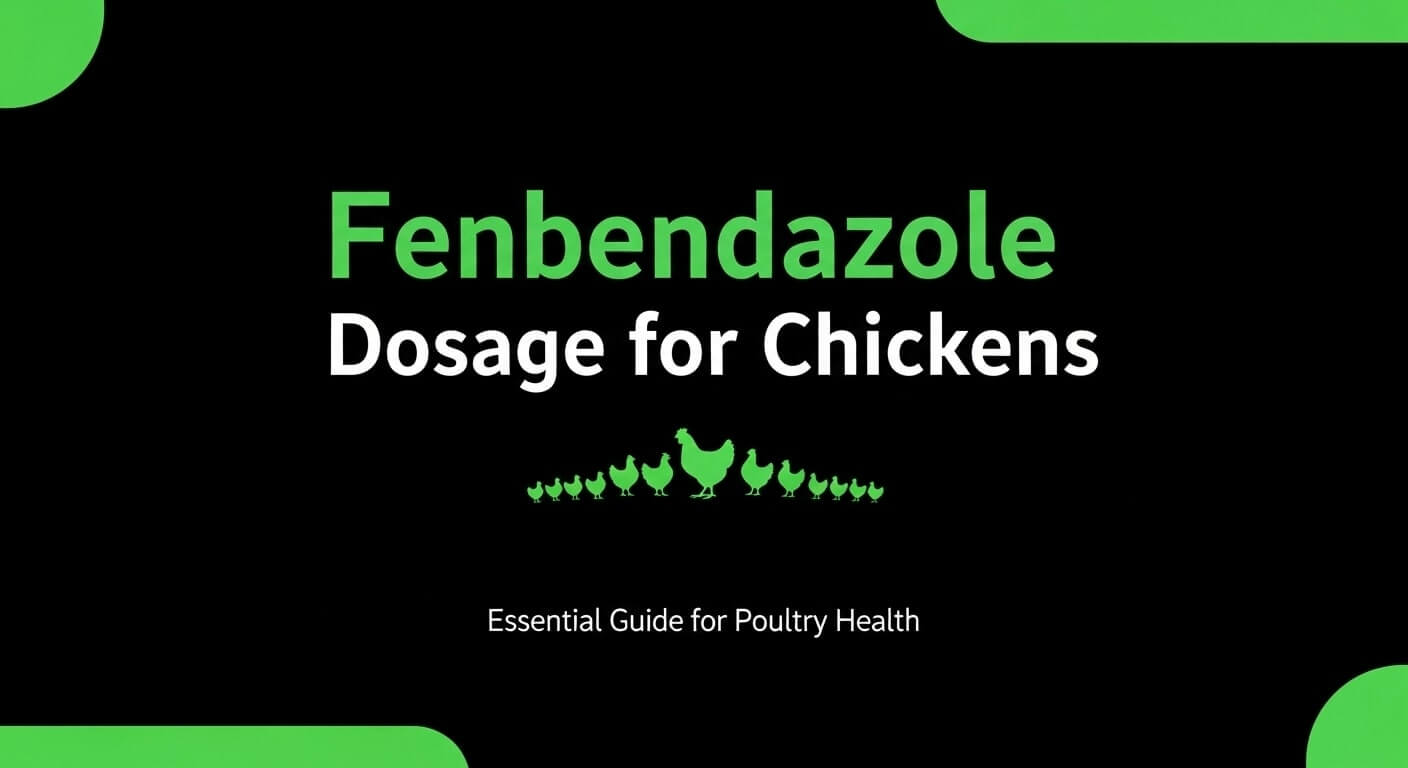
Fenbendazole dose for chickens – If you’re a poultry owner, keeping your chickens healthy is a top priority. One common issue that affects chickens is parasitic infections, which can lead to poor growth, reduced egg production, and even death if left untreated. Fenbendazole is a highly effective dewormer used to treat various internal parasites in chickens. In this comprehensive guide, we’ll cover everything you need to know about the fenbendazole dose for chickens, its benefits, safety, and administration tips.
What Is Fenbendazole?
Fenbendazole is a broad-spectrum anthelmintic (deworming) medication belonging to the benzimidazole class. It is widely used in veterinary medicine to treat gastrointestinal parasites such as:
- Roundworms (Ascaridia galli)
- Tapeworms (Raillietina spp.)
- Capillary worms (Capillaria spp.)
- Gapeworms (Syngamus trachea)
It works by disrupting the parasites’ energy metabolism, leading to their death. Fenbendazole is safe for chickens when administered correctly, making it a popular choice among poultry keepers.
Why Use Fenbendazole for Chickens?
Internal parasites can severely impact your flock’s health. Symptoms of worm infestations include:
- Weight loss despite normal eating
- Diarrhea or abnormal droppings
- Reduced egg production
- Lethargy and weakness
- Pale combs and wattles
Administering the correct fenbendazole dose for chickens helps eliminate these parasites, improving overall flock health and productivity.
Correct Fenbendazole Dose for Chickens
The recommended fenbendazole dose for chickens varies depending on the formulation used. Below are the standard dosages:
1. Fenbendazole Powder or Liquid (Oral Suspension)
- Dosage: 10–20 mg per kg of body weight
- Duration: Administer for 3–5 consecutive days
For example, a chicken weighing 2 kg (4.4 lbs) would need 20–40 mg of fenbendazole per day for 3–5 days.
2. Fenbendazole Pellets or Medicated Feed
Some commercial poultry dewormers contain fenbendazole in pre-measured doses. Follow the manufacturer’s instructions, but a general guideline is:
- Medicated Feed: Mix at a ratio of 0.5–1.0 kg per ton of feed
- Duration: Feed for 5–7 days
3. Fenbendazole Injectable Solution (Less Common for Chickens)
- Dosage: 5–10 mg per kg of body weight
- Administration: Given intramuscularly or subcutaneously (only under veterinary supervision)
How to Administer Fenbendazole to Chickens
1. Oral Administration (Liquid or Paste)
- Mix the correct fenbendazole dose for chickens with a small amount of water or feed.
- Use a syringe (without a needle) to administer the liquid directly into the beak.
- Ensure each chicken gets the full dose.
2. Medicated Feed or Water
- Mix fenbendazole powder with feed or water.
- Ensure all chickens consume the medicated feed for the full treatment period.
3. Individual Dosing for Severe Cases
- For heavily infested birds, individual dosing ensures accurate treatment.
- Weigh each chicken to calculate the precise fenbendazole dose for chickens.
Safety and Side Effects of Fenbendazole in Chickens
Fenbendazole is generally safe when used correctly, but some precautions include:
- Avoid Overdosing: Excessive doses may cause toxicity.
- Egg Withdrawal Period: Do not consume eggs for 7–14 days after treatment (check local regulations).
- Not for Meat Birds Close to Slaughter: Withhold treatment at least 14 days before processing.
When to Deworm Your Chickens?
Regular deworming helps prevent parasite outbreaks. Follow this schedule:
- Preventive Deworming: Every 3–6 months
- High-Risk Flocks (Free-range birds): Every 2–3 months
- After Confirmed Infestation: Treat immediately and repeat in 10–14 days to kill newly hatched worms.
Natural Alternatives to Fenbendazole
If you prefer natural dewormers, consider:
- Diatomaceous Earth (Food Grade)
- Garlic and Pumpkin Seeds
- Apple Cider Vinegar in Water
However, these may not be as effective as fenbendazole for severe infestations.
Frequently Asked Questions (FAQs)
1. Can I use fenbendazole for baby chicks?
Yes, but at a reduced dose (5–10 mg/kg). Consult a vet for very young chicks.
2. How long does fenbendazole take to work in chickens?
It starts working within 24–48 hours, but full effectiveness requires 3–5 days of treatment.
3. Can I eat eggs from treated hens?
Avoid consuming eggs for 7–14 days post-treatment to ensure drug clearance.
4. Is fenbendazole safe for other poultry (ducks, turkeys)?
Yes, but dosage may vary. Always check species-specific guidelines.
Conclusion
Administering the correct fenbendazole dose for chickens is crucial for maintaining a healthy flock. Whether you use liquid, powder, or medicated feed, following the recommended dosage and treatment duration ensures effective parasite control. Regular deworming, combined with good coop hygiene, will keep your chickens thriving.
By understanding the proper fenbendazole dose for chickens, you can protect your flock from harmful parasites and ensure optimal productivity. Always consult a veterinarian if you’re unsure about dosing or if your chickens show severe symptoms.
For more poultry health tips, stay tuned to our blog!


Comments (0)
Leave A Comment